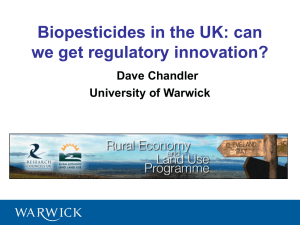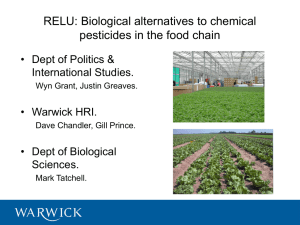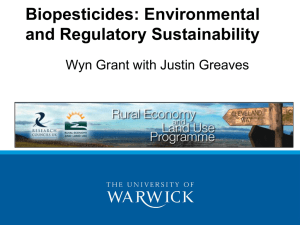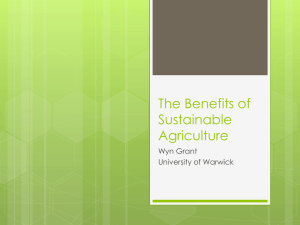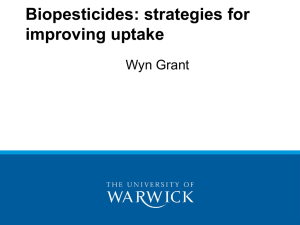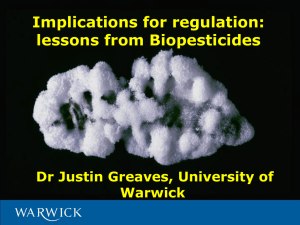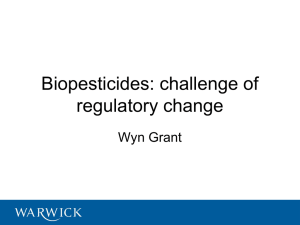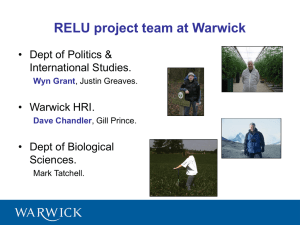Biopesticides: Environmental and Regulatory Sustainability David Chandler and Wyn Grant,
advertisement
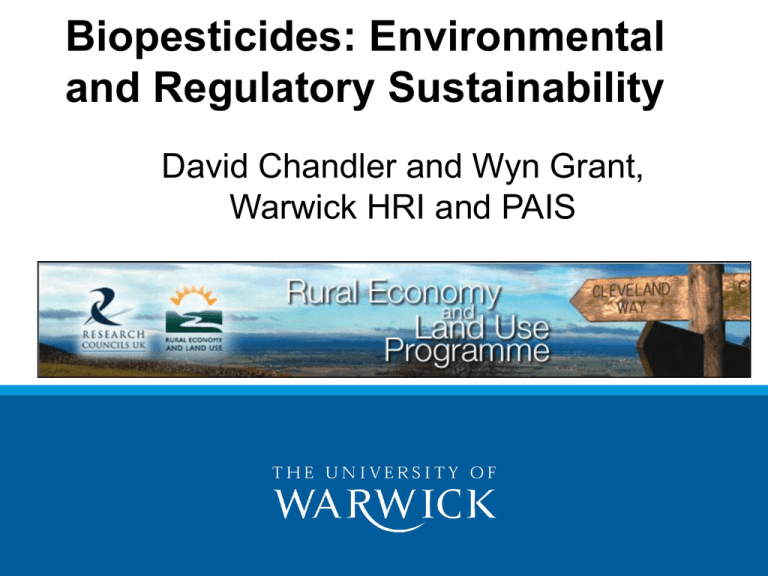
Biopesticides: Environmental and Regulatory Sustainability David Chandler and Wyn Grant, Warwick HRI and PAIS Crop Production & Pest Management: problems & opportunities • Pesticide product withdrawals. • Pesticide resistance. • Zero detectable residues. • Sustainable food chain: economic, environmental, social. • integrated pest management (IPM). Biopesticides: mass produced biologically based agents used for the control of plant pests • Living organisms (natural enemies) • Micro-organisms • (Arthropods & nematodes)* • Naturally occurring substances (‘biochemicals’) • Plant extracts. • Semiochemicals (pheromones & allelochemicals). • Commodity substances. • Genes (not EU). • Plant incorporated products. *Not regulated by Plant Protection Products (PPP) legislation. Pests = arthropods, plant pathogens & weeds. In the EU, microbes & biochemicals are registered as plant protection products • National authorisations (PSD). – Biopesticides Scheme • EU arrangements: – Harmonisation. – Mutual recognition. – Tailored requirements for biopesticides. Biopesticides & IPM • Often v. specific. • Compatible with other control agents. • Little or no residue. • Inexpensive to develop. • Natural enemies used in ecologically-based IPM. • Lower potency than synthetic pesticides. But uptake has been low & potential benefits are not yet being realised • Economics (market size, external costs). • Efficacy (potency, application, formulation). • IPM (integration, best use of biological characteristics). • Regulation (system principles, design & operation). • How can research help? Theory & application. Warwick research on biopesticides: insights from natural & political science (1) • Ecology of insect pathogenic fungi. – Genetic structure of natural populations. – Ecological factors determining the occurrence of natural populations. – Theoretical basis for understanding fate, behaviour & environmental impact of biopesticide strains. Warwick research on biopesticides: insights from natural & political science (2) • Analysis of biopesticide regulation using political science (multi level theories). – Underlying principles for regulation. – Interactions between stakeholders. – Role of retailers. – Cost benefit analysis. • Inform data requirements & regulatory process. Underlying principles (1) • Biopesticides have a key and specific role to play in crop protection as part of IPM – problems of resistance and reduced availability. • Biopesticides should be regulated – because something is ‘natural’ does not mean that it is safe. Underlying principles (2) • The regulatory system must support sustainability objectives. • This includes economic sustainability. • The ability of SMEs to succeed and growers to have the right plant protection tools. Underlying principles (3) • Pest management should be ecologically based. • Biopesticides offer benefits to conventional and organic farmers. • Credibility with all stakeholder groups and especially consumers is key. Improved knowledge base & chain • Better understanding of ecology of microbial control agents. • Availability of expertise for PSD and ACP. • A more effective knowledge chain linking, e.g., growers and researchers. Stakeholder involvement • A weak policy network • REBECA has helped, but how can it be continued? • Relative isolation of environmental groups • Further development of IBMA • Where is constituency of support? A quasi-governmental champion • Provided in USA by Biopesticides and Pollution Prevention Division of EPA. • PSD not really equipped for an advocacy role. • Possible role for Natural England? • Risk of case being sidelined. Organisation of PSD • Future structure under review, presents some challenges. • Continue to develop work of Biopesticides Champion and team. • They have been trained, now they need more customers. Strengthening ACP • Development of EU system will require some changes. • Needs an impartial expert on biopesticides and access to external advice. Efficacy testing • Submission of data not required in US. • Needed for marketing purposes and to protect product reputation. • Work of Biopesticides Steering Group at OECD. • Support REBECA proposal to allow applicants to defer efficacy testing. Biopesticides Scheme • A welcome development. • Still outreach challenges. • Importance of early pre-submission meetings. • Distinctive approval number for Biopesticides? Role of retailers • Reflect consumer concerns. • Ask for requirements that go beyond approvals system. • Legitimately commercially driven. • Variations between retailers. • Prohibit rather than promote specific products – which is difficult for them. European dimension • Revision of 91/414 not complete. • Concerns about way in which EFSA operates. • Development of informal networks between regulators. • Eco zone proposal has attracted some criticism. Assistance with costs • Still a gap between product ideas and an approved product on the market. • Some products may not be viable. • Market failure in terms of positive externalities not being realised? Cost-benefit analysis workshop • Natural and social science experts. • Brainstorming produced list of perceived costs and benefits. • Sorted across six stakeholder groups. CBA results • Negative balance for developers (-14) and growers (-9) • Moderately negative for retailers (-6) and evenly balanced for regulators (-1) • Positive for consumers (+2) and opinion formers (+7) • Is there a balance between private costs and public goods? RELU project team at Warwick • Dept of Politics & International Studies. Wyn Grant, Justin Greaves. • Warwick HRI. Dave Chandler, Gill Prince. • Dept of Biological Sciences. Mark Tatchell. http://www2.warwick.ac.uk/fac/soc/pais/biopesticides/ Visit our website
